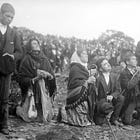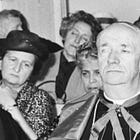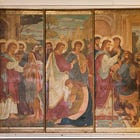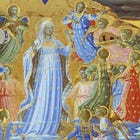Private Revelations, Theology and the Crisis – What should be their relationship?
Private revelations cannot be used to contradict traditional theology or short-circuit open questions without creating serious problems, especially in the current ecclesiastical crisis.
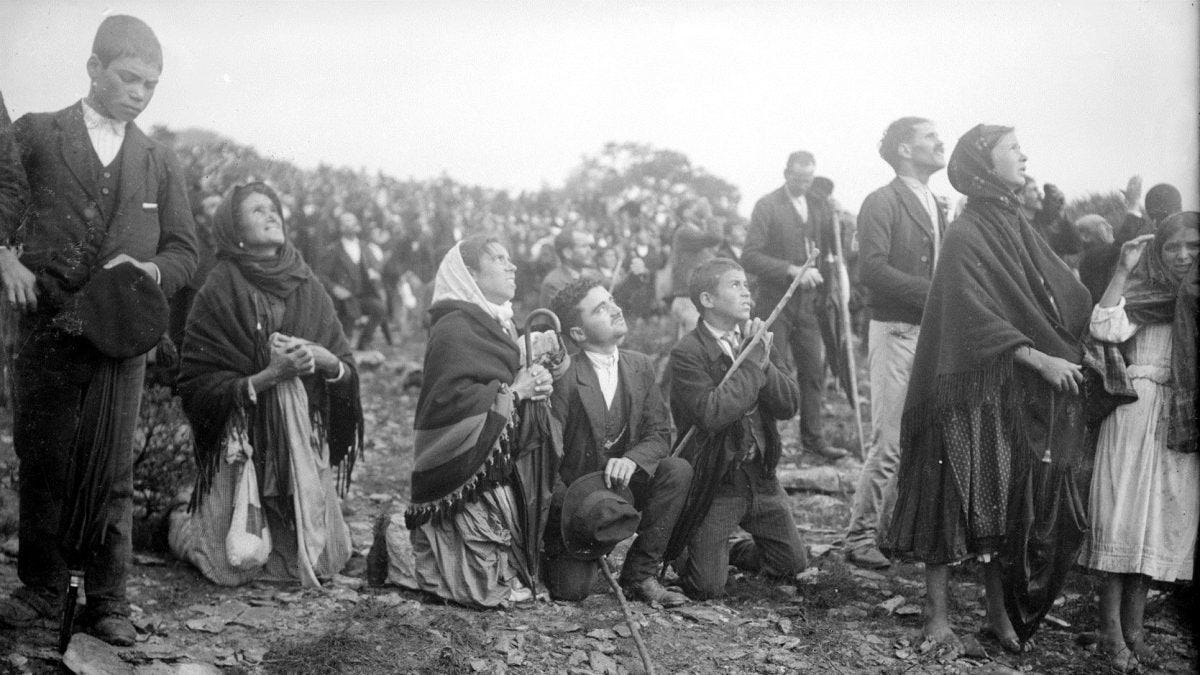
Throughout history, God has made private revelations to chosen souls, even for the public good. We could consider the revelations made to St Joan of Arc, which led to the victory of France over English rule; or the revelations of the Sacred Heart to St Margaret Mary Alacoque. In our time, we can call to mind the apparitions of Our Lady of Fatima, in Portugal.
See also:
At The WM Review, we believe that the revelations of Fatima carry a continuing importance for the Church and the World.
At this time, it is more important than ever to have the proper role of such revelations clearly fixed in our minds, and to understand how they interact with the doctrine and theology of the Church.
But what is this proper role, and what is the relationship between private revelations and theology, particularly regarding the decisions we must make in the post-conciliar wreckage?
The best way of examining this wider issue is in light of the Fatima apparitions themselves. When we see the proper place of private revelations which are so well attested, and have such approbation from the Church, the place of less well attested and less clearly approved apparitions and private revelations will be thrown into greater relief.
Private revelations, theology and decisions in the crisis
Over the past sixty years, various different groups have tried to “co-opt” the messages at Fatima in support of their theological positions. Some have even gone further, and used these revelations to rule out competing theological positions.
To take a controversial example: it is well-known that some have concluded, based on the facts and traditional theology, that the Holy See is currently vacant, and that Francis cannot be the legitimate Roman Pontiff. Some go further and apply this to Francis’ recent predecessors.
However, some believe that Our Lady’s request for the pope to consecrate Russia to her Immaculate Heart refutes such conclusions about Francis and the post-conciliar claimants to the papacy.
In other words, this request to consecrate Russia is taken as “proof” that Francis and recent predecessors must have all been true popes.
What are we to make of this? Whatever we think of the conclusion, is this a proper way to go about studying difficult questions?
1. Attempts to shut down the debate
While there can be genuine questions on how the pope question and the Fatima messages work together, arguments based on a supposed “incompatibility” are often attempts to end the debate through an appeal to a perceived authority.
This is essentially pious browbeating, by which someone uses his private interpretation of private revelation to shame his interlocutor into silence.
It is not legitimate to use such shame tactics based on private revelations in theological reasoning. If a Catholic in good faith is making erroneous points, these points must be refuted in a systematic way, and not shamed off the table.
Ad hominem arguments can feasibly be used as a rhetorical device at the service of truth. But any attempt to use private revelations in this way betrays a lack of real arguments, a lack of understanding of any given controversy, and a very serious misunderstanding of the relationship between private revelations and theology.
2. Bypasses the actual issues
By trying to short-circuit the discussion and shut down the debate, the actual issues are left in a sort of limbo. The issues do not go away or lose their importance simply because someone thinks that a private revelation contradicts a given conclusion.
To return to the example of Fatima: those who hold to the conclusion that Francis and his recent predecessors cannot have been legitimate popes do so, not because of any emotional reaction to the crisis, but because of numerous considerations arising from the Church’s teaching about herself. In particular:
The radical incompatibility between open heresy and membership of the Church (and thus also being elected or holding office in the Church)
The incompatibility between the Church’s infallibility and the imposition of a new Conciliar (or Conciliar-Synodal) religion following Vatican II, specifically
The imposition of universal disciplinary laws which are harmful and deleterious to the Catholic religion
The practical cessation of teaching and governing with authority, being replaced with the mere proposition of multiple errors (of varying notes) and the tyrannical exercise of raw power and ‘weaponised orthodoxy,’ working to the detriment of the Catholic religion, with little regard for the rule of law.
The after-the-fact evidence that Francis and his predecessors, even if they were indeed eligible, failed to accept the election to the papacy as traditionally understood (this defect of consent being due to accepting a new, Conciliar-Synodal papacy incompatible with the Roman Pontificate, akin to defects of consent in marriage cases)
The non-identity of the “Conciliar-Synodal Church” and the Roman Catholic Church, which alone is the true Church of Christ – with the vacancy of the Holy See being the only sufficient cause.
However, let’s grant for the sake of argument, that the messages of Fatima do indeed prove that Paul VI etc. were legitimate popes: if this were so, we would still be left with all of the above considerations that led to the other conclusion in the first place.
Some may think that they have saved the claims of Francis et al. through their private interpretation of private revelation – but they would only have done so at the expense of a received and traditional body of theology, which is very well established in the Church. This happens because they have misunderstood the relevant points and the force of the arguments.
This approach to private revelation implies either:
That this body of theology (approved and used by the Church) was in error – which is untenable for reasons discussed below; or
That the “non-pope” conclusion did not, in fact, flow from its premises.
In general, those taking this approach do not seem to realise the catastrophic implications of the first option; nor do they take any serious effort to demonstrate the second.
Even less do they realise that, if their private interpretations of private revelations contradict the settled theses of theology, then this is a very worrying sign indeed. If that theology – received, approved and promoted by the Church for centuries – was wrong, then it is difficult to see how the toleration of such a false body of theology would not have already constituted a defection of the Church.
But this is impossible; therefore the solution must lie elsewhere.
This problem could lie either in a misunderstanding of that theology, or in a misunderstanding of contingent facts. We believe that we have taken all due precautions to understand this theology correctly; as such we choose what it teaches over the contingent claims of particular claimants.
What if a miraculous sign appeared to attest to the validity of such men’s claims to the papacy?
Francis’ 2022 “consecration”
This issue appeared in the lead-up to Francis’ proposed consecration of Russia and Ukraine to the Immaculate Heart, along the lines of Our Lady of Fatima’s request. What would it have meant if some miraculous event had indeed followed, such as the conversion of Russia?
Although this event is in the past, and little appeared to have come from it, this issue remains relevant because such questions could easily arise about future signs and wonders.
Let us imagine that something like a spectacular “conversion of Russia” occurred. Such an event might be more or less impressive – but even if it appeared to be a true conversion, it would not somehow resolve the many questions around the recent popes “by the back door.”
If it were to resolve the Pope Question by default, it would require a radical “rethink” of those doctrinal issues already mentioned, which had pointed to that conclusion. In this context, “rethinking” is perhaps too polite: if we accept Francis as pope, we must reject the settled Catholic doctrine on those issues of membership, ecclesiology, infallibility and so on – which we cannot do.
As such, this just brings us back to the dilemma above.
In any case, it seems inevitable that such potential signs and wonders would cause serious division amongst Catholics trying to hold to tradition. Such division would be impossible if we made traditional theology our criteria for truth, rather than our private interpretations of private revelations and apparently miraculous occurrences.
3. Not the purpose of private revelations
As suggested above, private revelations are not the proper data by which theological questions are decided.
It is true that we are told that some theologians, such as St Thomas Aquinas, were assisted in their theological work by apparitions of Saints (in his case, Sts Peter and Paul). But while we may believe this, the reality is that St Thomas’s writings come with his authority and that of the Church approving them – not with the authority of such apparitions.
This is so, even if they were true apparitions.
Some apparitions may provide a sort of “confirmation” of certain ideas – for example, the words of Our Lady of Lourdes in 1858 (“I am the Immaculate Conception”) are taken to be a confirmation of the 1854 definition. But while this is interesting and edifying, we should be clear that we did not need such a confirmation for something that had just been defined by the Church.
Aside from this being an improper way of approaching theology or ascertaining truth in difficult situations, we should also recall that private revelations generally serve a particular purpose, and ought not to be used to comment on some other issue.
For Fatima, this includes several important instructions for our day, including:
The universal call to penance
The recitation of the Rosary
Devotion to the Immaculate Heart
The consecration of Russia to the Immaculate Heart by the pope, in union with the bishops
The First Saturday devotion
Warnings about what would happen if various requests were not fulfilled.
But these revelations were not intended to settle questions like those around the status of the post-conciliar popes (although perhaps the unreleased Third Secret may contain something on this topic). If someone wants to claim otherwise, they carry the burden of proof.
It would also be a mistake to take the apparent silence of an approved apparition as a piece of theological data. God has his own reasons for deciding what to reveal to his chosen souls, and we should not read into things in this way. The apparent silence of these apparitions about a long vacancy of the Holy See does not disprove the thesis.
For theology as a science, what private revelations tell us (or don’t tell us) might be interesting, enlightening and useful, but there is no reason to think that the Fatima apparitions were intended by God to settle theological disputes amongst traditionalists decades later. Radical theological disputes from history have not been resolved in this way, which creates a strong presumption against this idea.
Needless to say, there is even less reason to think that Heaven would intend to cause a radical reform of the established theology of the Church by means of a private revelation, applied indirectly, to issues that were not at hand at the time. Any apparition that did try to cause such a reform would be immediately suspect.
Saying this does not mean that the importance of private revelations is necessarily limited to the chosen soul herself – think of the national significance of the Sacred Heart for France, for example.
I am also not saying that private revelations cannot be enormously important for our time. It is possible that when our current crisis is resolved, the resolution will be confirmed by miracles related to Fatima (like the conversion of Russia), or on a similar level to the miracle of the Sun – but the triumph of the Church will be a great moral miracle in itself.
However, we must keep things in the right order, and remember that the Catholic religion as represented in the magisterium, theological works, and catechisms is already complete and sufficient. The relative difficulty in hearing the voice of a living hierarchy in our day does not transfer the power of magisterium from the Church to private revelation, seers, miracle-workers or dreamers of dreams. On the contrary, our duty in this time is to adhere firmly, immovably to tradition, as found in the acts of the ‘quasi-contemporary magisterium’ (as the theologian Nicolau says) and the monuments of tradition, particularly traditional theology.
There are no secret, mystical or esoteric updates to our religion ahead of us – and a radical reformation or rejection of traditional theology on the basis of private revelation would be just that.
4. Illogical arguments and inaccurate representations of the revelations themselves
Finally, let’s note that the arguments mentioned do not even make sense as arguments.
We can see this most clearly when they are expressed in syllogistic form. For example:
Heaven never requests or commands an impossibility. (True premise, in itself.)
Heaven would be requesting an impossibility if (in 1929) Our Lady of Fatima requested that the Pope consecrate Russia to the Immaculate Heart, and there has been a long interregnum from around 1965. (False premise.)
Therefore there cannot have been a long interregnum from around 1965.
The second premise is clearly gratuitous. The popes prior to a post-conciliar interregnum could have fulfilled the request; and so could a pope that after an interregnum. As such the conclusion does not follow.
But it is even more absurd – really, very absurd – to insist that a group of putative popes must have been legitimate, because otherwise they could not have done something that they did not in fact do.
A similar argument has been proposed about Padre Pio. One argument proceeds along these lines:
If we were entering an extended vacancy of the Holy See, then God would have told Padre Pio; but we have no indication that he did; therefore the post-conciliar claimants have been true popes.
But this is hardly compelling, for the following reasons:
It is by no means certain that God must tell any given mystic about any given subject. As St Paul said, quoting the prophet Isaias: “How incomprehensible are his judgments, and how unsearchable his ways! ‘For who hath known the mind of the Lord? Or who hath been his counsellor?’” Arguments like the one above seems only to be saved from presumption by naivety, having forgotten that God himself has told us that his thoughts and ways are not our ways, and are exalted above ours like the heavens over the earth. The proper response to such an attitude is seen in the words of Our Lord to St Peter, about the Beloved Disciple: “So I will have him to remain till I come, what is it to thee? Follow thou me.”
It is by no means certain that God would not tolerate any given mystic being mistaken about a matter such as whether or not Paul VI was the true pope or not; and it does appear, from a letter written in 1968, that Padre Pio did think that Paul VI was legitimate.1 But all this shows is that being mistaken about the identity of the true pope does not cause someone to cease to be a Catholic—which is precisely what we and many others have argued at length elsewhere.
It is by no means certain that, if Paul VI somehow retained the papacy, that the same applies to John Paul II, Benedict XVI or Francis.2
In other words, it seems absurd to think that our lack of knowledge about what God did or did not tell Padre Pio about Paul VI and the subsequent claimants is proof that Francis is the Pope.
Finally, without conceding any legitimacy to such arguments based on the testimony of mystics, we could note that the famous Roman exorcist Fr Gabriele Amorth allegedly told the author José María Zavala that Padre Pio said the following to him:
“You know, Gabriele? It is Satan who has been introduced into the bosom of the Church and within a very short time will come to rule a false Church.”
The conversation itself touched on the possibility of a false pope.3
Now, if it turned out that Padre Pio had discussed an extended vacancy, would that prove our point?
And returning to Fatima: as I have shown elsewhere, the actual words of the messages can even be read so as to promise a long interregnum if the divine requests were not fulfilled. Would this prove our point?
No, to both; and that is the whole point of this piece. We are dealing with a theological matter, and we reach certainty through theological methods—not private revelations. Such evidence might be interesting, and show the uncertainty of the usual arguments we have been discussing, but it is not proper data for attaining theological certainty about a question of such theological importance.
Conclusion
But all of this goes to show the danger of using private interpretations of private revelations to overthrow the settled theses of theology. Typically, those doing so are not quite aware of what they are doing, and simply deny that this is what their ideas entail.
We are as interested in the Fatima messages as anyone else, but we must keep an order of priority of things in our minds. We do not need these things in the same way that we need our basic catechism, basic doctrine and basic theology.
But if this is how we should treat revelations approved by the Church, should we not fly anything that takes us away from these foundational sources, or runs contrary to them, as well as all kinds of esotericism and all kinds of thirst for mystical novelties?
Let the same principles stand for any apparent miracles in our day. Credulity is not a Christian virtue: we should be slow to conclude that something is a miracle, and cautious in interpreting what claims, persons or groups a miracle apparently vindicates.
Again, although I have taken the Fatima revelations as the focus for this short piece, I am by no means denying their singular and ongoing importance for our time. Nor am I criticising anyone interested in these revelations.
But I am arguing, that private revelations cannot be used to contradict traditional theology, or the conclusions that flow from it, without falling into very serious problems.
Further Reading
HELP KEEP THE WM REVIEW ONLINE!
As we expand The WM Review we would like to keep providing free articles for everyone. If you have benefitted from our content please do consider supporting us financially.
A subscription from you helps ensure that we can keep writing and sharing free material for all.
Plus, you will get access to our exclusive members-only material!
Thank you!
Follow on Twitter and Telegram:
NB: We exclude John Paul I from this list due to a lack of data and a lack of necessity to make a judgment. We also habitually refrain from drawing a firm conclusion about John XXIII for similar reasons.
Zavala’s conversation with Amorth proceeded as follows:
“Indeed,” [Amorth] states, “One day Padre Pio said to me very sorrowfully: ‘You know, Gabriele? It is Satan who has been introduced into the bosom of the Church and within a very short time will come to rule a false church.’”
“Oh my God! Some kind of Antichrist! When did he prophesy this to you?” [Zavala asks].
“It must have been about 1960, since I was already a priest then.”
“Was that why John XXIII had such a panic about publishing the Third Secret of Fatima, so that the people wouldn’t think that he was the anti-pope or whatever it was …?”
A slight but knowing smile curls the lips of Father Amorth.
“Did Padre Pio say anything else to you about future catastrophes: earthquakes, floods, wars, epidemics, hunger …? Did he allude to the same plagues prophesied in the Holy Scriptures?” [asks Mr. Zavala]
“Nothing of the sort mattered to him, however terrifying they proved to be, except for the great apostasy within the Church. This was the issue that really tormented him and for which he prayed and offered a great part of his suffering, crucified out of love.” [says Fr. Amorth]
“The Third Secret of Fatima?”
“Exactly.” (Zavala 231)
Unterhalt also says the following:
Padre Pio’s special connection with the message of Fatima was also revealed in 2017 in an enormously enlightening dimension: It was disclosed that he even knew the Third Secret – it had already been revealed to him four years before the shepherd children. The renowned journalist José María Zavala testifies to this in his book El secreto mejor guardado de Fátima, which he published to mark the 100th anniversary of the apparitions. In this investigative work, the Spanish author refers to his extensive interview with Don Gabriele Amorth, a spiritual son of Padre Pio. In it, the famous exorcist reveals what the stigmatized saint, struck to the core and shocked, confided to him about the Third Secret: “It is Satan who has entered the womb of the Church, and within a while he will rule over a false church.”[18]
Zavala questioned Don Gabriele Amorth about this in more detail and, as the conclusion of the dialogue, states the following: “There were two recurring and interrelated themes: the great apostasy in the Church from its apex – in accordance with the testimony of Cardinal Ciappi – and the introduction of the devil to the head of the Church by means of the ‘Pope under the control of Satan.’”
José María Zavala, El secreto mejor guardado de Fátima, Spanish edition, Planeta Publishing 2017, quoted in Fr Frank Unterhalt’s essay on the Third Secret of Fatima.




